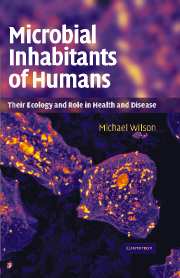Book contents
- Frontmatter
- Contents
- Preface
- Abbreviations used for microbial genera
- 1 An introduction to the human–microbe symbiosis
- 2 The skin and its indigenous microbiota
- 3 The eye and its indigenous microbiota
- 4 The respiratory system and its indigenous microbiota
- 5 The urinary system and its indigenous microbiota
- 6 The reproductive system and its indigenous microbiota
- 7 The gastrointestinal tract and its indigenous microbiota
- 8 The oral cavity and its indigenous microbiota
- 9 Role of the indigenous microbiota in maintaining human health
- 10 Manipulation of the indigenous microbiota
- Index
9 - Role of the indigenous microbiota in maintaining human health
Published online by Cambridge University Press: 06 July 2010
- Frontmatter
- Contents
- Preface
- Abbreviations used for microbial genera
- 1 An introduction to the human–microbe symbiosis
- 2 The skin and its indigenous microbiota
- 3 The eye and its indigenous microbiota
- 4 The respiratory system and its indigenous microbiota
- 5 The urinary system and its indigenous microbiota
- 6 The reproductive system and its indigenous microbiota
- 7 The gastrointestinal tract and its indigenous microbiota
- 8 The oral cavity and its indigenous microbiota
- 9 Role of the indigenous microbiota in maintaining human health
- 10 Manipulation of the indigenous microbiota
- Index
Summary
It has been recognised for many years that the indigenous microbiota has an important role to play in maintaining the health of an individual by preventing colonisation by exogenous pathogens. However, this “barrier” function is far from being the only contribution that the microbiota makes to the well–being of its host (Table 9.1). It is well established that resident microbes contribute significantly to human development and nutrition and are an effective means of neutralising potentially toxic dietary components. Most (approximately 1014) of the microbial inhabitants of a human being are located in the colon, which also harbours one of the most diverse of the resident microbial communities. The activities of this microbiota, therefore, are likely to have the greatest impact on human development and health, and have been the most extensively investigated. Studies of the role played by microbial communities inhabiting other sites in maintaining human health have largely been devoted to their ability to prevent colonisation by exogenous pathogens. Ethical considerations limit the type of experiments that can be carried out using humans; therefore, much of our knowledge of the role of the indigenous microbiota on mammalian development and health have come from studies involving animals.
Colonisation resistance
Exclusion of exogenous microbes
Co–evolution has ensured that each exposed surface of a human being is colonised by microbes exquisitely adapted to that particular environment.
- Type
- Chapter
- Information
- Microbial Inhabitants of HumansTheir Ecology and Role in Health and Disease, pp. 375 - 394Publisher: Cambridge University PressPrint publication year: 2004
- 1
- Cited by

